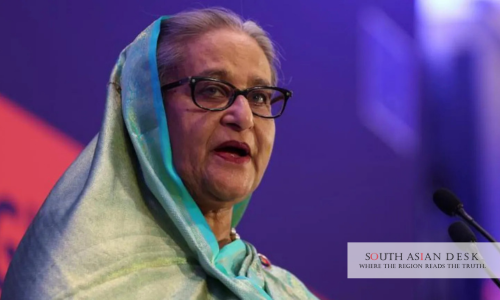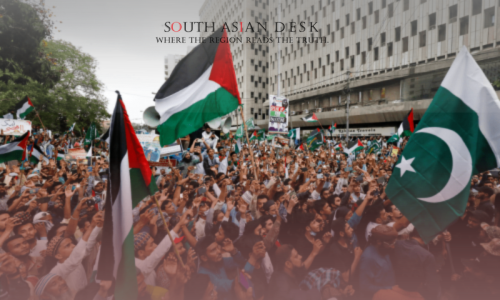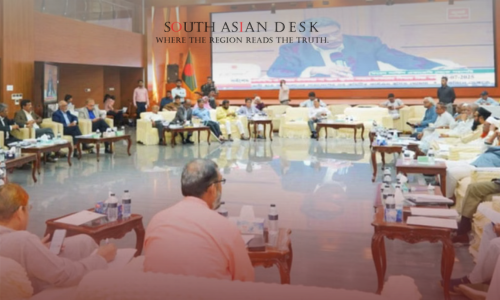Dhaka, Bangladesh (South Asian Desk) – Bangladesh’s chief prosecutor demanded the Sheikh Hasina death penalty on Thursday for crimes against humanity linked to 1,400 protest deaths last year. The International Crimes Tribunal heard the plea in absentia as Hasina remains in India. The case stems from July 2024 unrest that toppled her government. Who: Tajul Islam, chief prosecutor. What: Death penalty demand. When: October 16, 2025. Where: Dhaka tribunal. Why: Alleged orders for lethal force. How: Court arguments based on evidence and witness accounts.
This development marks a pivotal moment in Bangladesh’s quest for accountability after the 2024 uprising. The Sheikh Hasina death penalty bid underscores tensions in South Asia, where Hasina’s ousting strained ties with India, her refuge. It signals the interim government’s resolve under Muhammad Yunus to address past abuses, potentially influencing regional stability and human rights norms. Neighbouring countries watch closely, as extradition talks could escalate diplomatic friction. For South Asia, the trial highlights the fragility of democratic transitions amid youth-led movements, echoing protests in Pakistan and Sri Lanka.
Bangladesh Ex-PM Hasina Trial Enters Critical Phase
The Bangladesh ex-PM Hasina trial resumed on October 16, 2025, with prosecutors wrapping up arguments. Chief Prosecutor Mohammad Tajul Islam addressed the three-member bench led by Justice Md Golam Mortuza Majumder. Islam argued that Hasina orchestrated a systematic crackdown during the quota protests that began in July 2024.
Protests erupted over civil service job quotas favouring 1971 war veterans’ kin. Demonstrations swelled into calls for Hasina’s resignation. Security forces responded with force, leading to widespread casualties. Tribunal records show at least 1,400 deaths over six weeks, the deadliest unrest since independence.
Islam presented evidence including a leaked audio where Hasina allegedly instructed officials to deploy lethal weapons. “Her goal was to cling to power permanently, for herself and her family,” Islam stated in court. He added, “She has turned into a hardened criminal and shows no remorse for the brutality she has committed.”
The charges encompass murder, torture, and enforced disappearances under crimes against humanity. Hasina faces trial alongside former Home Minister Asaduzzaman Khan Kamal, who is also in hiding, and ex-Police Chief Chowdhury Abdullah Al-Mamun, who pleaded guilty in July 2025.
Kamal faces a similar Sheikh Hasina death penalty demand. Prosecutors seek capital punishment for his role in coordinating the response. Al-Mamun awaits sentencing after cooperating with investigators.
Hasina’s state-appointed lawyer countered that police acted in self-defence against violent protesters. The former leader denies all allegations, maintaining the crackdown quelled a threat to national security.
Hasina Crimes Against Humanity Charges Detailed
The Hasina crimes against humanity charges centre on events from July to August 2024. Prosecutors submitted over 100 witness testimonies and forensic reports. Key incidents include the August 5, 2024, clash in Dhaka’s Mirpur area, where police killed 52 civilians in one neighbourhood.
Tribunal documents list 1,351 deaths attributed directly to security actions, plus hundreds injured or missing. “For a single murder, one death penalty is the rule. For 1,400 murders, she deserves 1,400 death sentences,” Islam told reporters post-hearing. “Since that is not humanly possible, we demand at least one.”
This marks the first major case under the International Crimes Tribunal against a sitting leader’s inner circle. Established in 2010 for 1971 war crimes, the ICT now probes recent atrocities via 2024 amendments.
Hasina, 77, fled to India on August 5, 2024, by helicopter as crowds stormed her Dhaka residence. She has resided in New Delhi since, rejecting extradition requests. Bangladesh-India relations soured, with Dhaka accusing New Delhi of shielding her.
Interim Chief Adviser Muhammad Yunus, appointed post-uprising, backs the proceedings. His administration views the trial as essential for reconciliation. “Justice must prevail for the youth who sacrificed their lives,” Yunus said in a September 2025 address.
Bangladesh Prosecutor Demands Death for Hasina: Legal Ramifications
The Bangladesh prosecutor demands death for Hasina plea follows months of investigations. The ICT indicted her in November 2024 on 11 counts. Proceedings advanced despite her absence, with video-link options rejected by the defence.
Legal experts note the trial’s speed, contrasting slower 1971 cases. “This sets a precedent for holding leaders accountable in real-time,” said Dhaka-based analyst Reza Kibria. Yet, concerns linger over fairness, given the tribunal’s domestic nature.
Hasina already serves a six-month contempt sentence from August 2025 and faces separate corruption probes. Assets worth BDT 5 billion (USD 42 million) remain frozen.
Protesters gathered outside the tribunal on October 16, chanting for justice. Families of victims, like 22-year-old Abu Sayed’s mother, attended. “We lost our son to bullets ordered from the top,” she said. Sayed became a protest icon after his death on July 16, 2024.
The bench reserved its verdict, expected within weeks. If convicted, appeals could reach Bangladesh’s Supreme Court.
Background: From Protests to Power Shift
The unrest traces to July 2024 quota reforms. Students demanded merit-based hiring, sparking nationwide fury. Hasina’s government imposed internet blackouts and curfews, escalating tensions.
By early August, the army withdrew support. Hasina resigned, ending her 15-year tenure. The student-led movement installed Yunus’s caretaker regime, pledging reforms.
Over 12,000 arrests followed the uprising, targeting Awami League loyalists. The party faces a potential ban, with leaders in exile or custody.
India’s support for Hasina drew criticism from Dhaka. Border clashes rose 20% in 2025, per Bangladesh border guards data.
What’s Next: Extradition and Regional Fallout
The Sheikh Hasina death penalty outcome could prompt formal extradition bids. Dhaka plans to invoke the 2010 India-Bangladesh treaty. New Delhi has not commented officially.
Yunus’s government eyes elections by mid-2026. Trial results may sway voter sentiment, bolstering reformist credentials.
In South Asia, the case tests multilateral ties. Pakistan and Sri Lanka monitor for protest-handling lessons. Human Rights Watch urged fair trials, warning against politicisation.
As the gavel falls, Bangladesh confronts its past to forge a future free from impunity. The Sheikh Hasina death penalty demand encapsulates this reckoning.
Published in SouthAsianDesk, October 18th, 2025
Follow SouthAsianDesk on X, Instagram, and Facebook for insights on business and current affairs from across South Asia.






